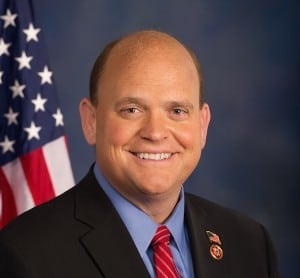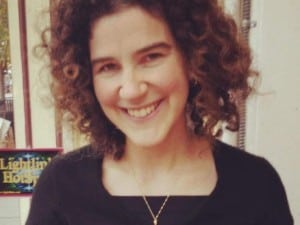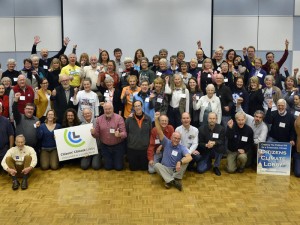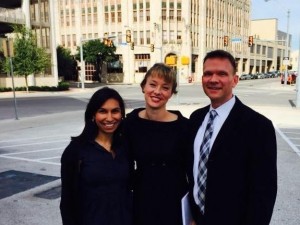By Andrew Beahrs
With the COP21 talks in Paris having concluded with an agreement that even the most enthusiastic proponents view as only a first, necessary step toward a clean energy future, it’s a great time for a closer look at how CCL volunteers continue building political will for climate action right here at home.
A terrific example comes from New York’s 23rd district, where, last month, Representative Tom Reed became the twelfth signatory to H. Res 424, or the Republican climate resolution, introduced by Rep. Chris Gibson (R-NY). Acknowledging that “if left unaddressed, the consequences of a changing climate have the potential to adversely impact all Americans,” the resolution provides a hopeful sign of progress along the road to bipartisan climate action.
At first glance, Representative Reed might have seemed like an unlikely signatory. Hailing from a deeply conservative district, and having been elected with nearly a two-thirds majority, there didn’t appear to be any obvious political incentives for him to join the resolution — or even an easy way for him to become aware of his constituents’ support for it. That’s where Miranda Phillips and the rest of the Ithaca chapter came in.
Realizing that an unexpectedly stiff challenge in the 2016 elections might encourage Reed to court unusual avenues for public favor, their strategy began with identifying their own strengths. “We didn’t berate ourselves and say, ‘Oh man, we should be doing more letters to the editor,’” she says. “Instead we asked: What are the things we’re motivated to do, are skilled at, and have time for?”
In this case, that meant publishing nine op-eds (some from CCL Executive Director Mark Reynolds) and four letters to the editor; in both cases, some called directly upon Rep. Reed to join the resolution. They also held eight meetings, including 3 town halls, and recruited 16 local constituents to call in support of signing: “Not a lot, but enough,” Miranda says (Liaison Coordinator Ashley Hunt-Martorano had counseled the group that congressional offices sit up and pay attention when they receive a dozen or so calls on an issue).
The Ithaca chapter is clear, however, that theirs was not a one-size-fits-all approach. “I wouldn’t want people to look at our nine op-eds and say, ‘Oh, we need to have nine op-eds’ just because that’s what we had,” Miranda says. “People should think about what they’re good at, and motivated to do, and go on from there. Just choose the best leverage points for you, whether that’s letters, op-eds, meetings, or whatever.”
In this instance, what was it that finally moved Reed to act? The truth is that Miranda doesn’t know — and that’s a lesson in itself.
“We have no idea to what extent we influenced Reed, and which of our actions, if any, made the most difference,” she wrote later. “But given that he’s in a tight race this year, and we brought in our June meeting constituents from the most conservative and liberal parts of the district simultaneously — and given the advice from Gibson himself to CCL volunteers that letters to the editor are the most effective thing we can do to bring more co-sponsors to the resolution — I have to believe that our meetings, op-eds and LTEs in NY-23 did indeed make a difference. So just keep working whatever points of leverage you’re able. They will produce in due time.”
Perhaps the most inspiring part of the chapter’s success is that it was entirely unexpected. When she got the word from Reed’s office that he would be joining the resolution, it came as part of a response to a typical meeting request. “I just about fell out of my chair,” Miranda remembers.
In fact, far from being a steady build to a final great payoff, Reed’s endorsement came at what had seemed like a low point in the relationship between his office and the CCL chapter. Responses from the chapter’s usual staff contact had been few and far between, and they had begun reaching out along new avenues. “If one person is unresponsive, try another,” Miranda suggests. In this case, their new contact helped to re-establish contact with their older one… who then passed on the news about Reed’s decision.
The most important thing, in the end, was the steady work — just “keeping our noses to the grindstone,” as Miranda says — of building relationships both within and beyond CCL. One high point came when the chapter met fellow constituent Brian Webb at the International Conference just before June. As the Sustainability Coordinator at Houghton College, a Christian college in NY-23’s Genesee Valley — a notably conservative part of the district — Brian provided a valuable voice during the D.C. meeting and subsequent outreach. In fact, Miranda notes, as Reed learned about Brian’s background, he “visibly relaxed,” and the conversation proceeded at a high, respectful level.
Miranda and Houston chapter leader Peter Bryn later put together some relevant thoughts on how to reach diverse audiences with CCL’s message. Miranda and Peter recommend being careful not to rush; concentrating on building relationships and finding common ground; and making use of CCL tools, such as the “Proactive Outreach” group on CCL community (more suggestions, including a list of good outreach targets, are available at the above link). By following these simple guidelines, existing groups might find a way to broaden and diversify the voices available during congressional meetings.
Miranda stresses, though, that the key to success with Reed was not any single voice or action so much as steady, patient preparation. By the time of the June conference, the chapter had already prepared a great deal and was ready to assign meeting roles and strategy in keeping with what they’d already learned about Reed and his office.
Steady preparation; persistent, respectful communication; forming long-term relationships. That’s called building political will.
Andrew Beahrs is Strategic Partnerships Coordinator for Citizens’ Climate Lobby.





